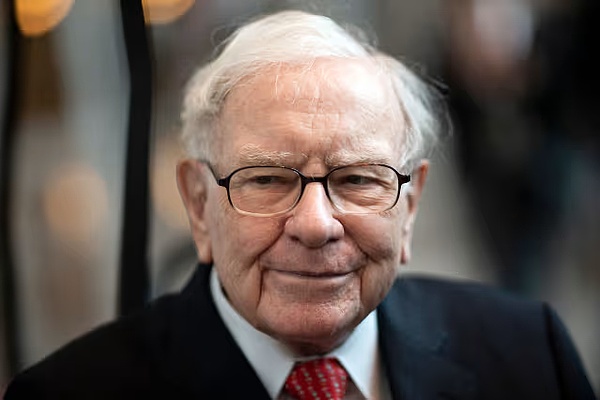Source: Barron's Chinese
For a long time, people have been speculating who will be Buffett's successor. In his annual letter to shareholders released on the morning of February 22, local time, Buffett wrote, "I am 94 years old, and soon Greg Abel will take over as CEO and write the annual letter to shareholders."
Buffett clearly confirmed two things in the letter: Abel, CEO of Berkshire Hathaway Energy and vice chairman of Berkshire's non-insurance business, is his successor; the handover will come soon.

The reason why Buffett's letter to shareholders has attracted the attention of investors around the world is not only because Berkshire often makes some groundbreaking moves, but also because of Buffett's profound insights into investment and economics - sometimes even society, politics and marriage. The 15-page letter continued the trend of fewer pages than the previous year and did not contain much content related to these two groups of topics. (Click "Read Original" to view the full text of the letter to shareholders)
But then again, Buffett is 94 years old, and as he recently told Fortune magazine, "I still enjoy my work very much, and there are some things I can do quite well, but I have canceled other activities or greatly reduced them."
The fourth-quarter earnings report released with the letter to shareholders showed that Berkshire's cash reserves reached a record $334.2 billion, but Buffett said that Berkshire would rather hold stocks than cash.
Buffett wrote in the letter, "If the wind of fiscal recklessness continues to blow, the value of paper money will evaporate. Some countries have made such reckless practices a habit, and the United States has been close to that edge in its short history. Fixed-coupon bonds cannot prevent currency runaway."
Buffett also wrote, "Berkshire will never prefer to hold cash instead of investing in good companies, whether through wholly owned or partially owned."
Buffett pointed out in the letter that operating profit is the performance metric he pays most attention to. Berkshire's operating profit will increase by 26.7% from $37.4 billion in 2023 to $47.4 billion in 2024. Buffett said that the strong performance of Geico's insurance business, which has maintained a turnaround in recent quarters, is one of the reasons for Berkshire's operating profit growth. Buffett attributed Geico's growth to Geico CEO and Berkshire investment manager Todd Combs.
Buffett wrote, "Geico is a long-owned gem that Berkshire needs to re-polish, and Todd has worked tirelessly to do this work. Although the work is not over, the progress made in 2024 is amazing."
The pricing of Berkshire's "very important" property and casualty insurance business, which Buffett called Berkshire, rose, "reflecting the sharp increase in losses caused by convective weather." Insurance companies tend to raise prices after losses occur.
Buffett wrote, "Climate change may have arrived, and insurance losses of astonishing scale may appear one day, any day, and no one can guarantee that such losses will only occur once a year."
Buffett also wrote in the letter that Berkshire pays more taxes to the U.S. Treasury than any other company. Berkshire paid $26.8 billion in taxes in 2024, he wrote, "far more than the corporate income tax collected by the U.S. government from any company...about 5% of all corporate taxes in the United States." In Berkshire's 60-year history, the company has paid $101 billion in taxes.
Berkshire's earnings were strong last year, but the company has been stymied in doing what it does best: investing. With stock prices high, Buffett and his two deputies saw no company's stock price as attractive enough, and Berkshire sold about $134 billion worth of stocks last year, mostly Apple (AAPL) shares.
Because Berkshire doesn't pay a dividend, its cash pile has surged to $334.2 billion from $168 billion at the end of 2023, roughly equivalent to the market value of Berkshire's long-term investment target Coca-Cola (KO).
In his letter, Buffett talked about Berkshire's increased investments in five Japanese trading companies: Itochu, Marubeni, Mitsubishi, Mitsui and Sumitomo. Buffett said the five companies are similar to Berkshire because they all "hold stakes in businesses in different industries."
Buffett said the total cost of the investment in the five Japanese trading companies (Berkshire began buying their shares in 2019) was $13.8 billion and is now worth $23.5 billion. "Over time, you may see Berkshire's holdings in these five companies increase further," Buffett wrote.
The letter ended on a heavy note, with Buffett saying that this year's Berkshire Annual Meeting - often called the "Woodstock of Capitalists" - will be a "redesigned party." There will be no funny videos played before the annual meeting as in the past, nor will it last until the evening. This year's annual meeting will end at 1 p.m.
Berkshire's 2025 annual shareholder meeting will be held on Saturday, May 3, local time, at the CHI Health Center in Omaha, Nebraska.
 JinseFinance
JinseFinance







